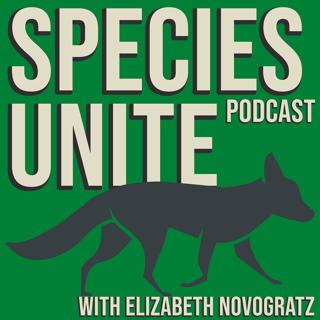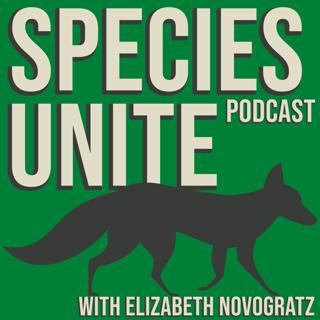
John Kinder: World War Zoos
John Kinder is the director of American studies and a professor of history at Oklahoma State University. And he is an author. His most recent book is called World War Zoos: Humans and Other Animals in the Deadliest Conflict of the Modern Age. John's book tells a story most of us have never heard: what happened to the world's zoos—and the animals inside them—during World War II. It's a sweeping, deeply researched look at how zoos became sites of propaganda, patriotism, and survival, often at the expense of the animals themselves. But World War Zoos isn't just about the past. It's also a mirror, showing how many of the ethical blind spots that existed during wartime remain with us today. In an age of climate crisis and mass extinction, this conversation asks: what do zoos really stand for—and who are they really serving?
16 Maj 42min

Richard (Kudo) Couto: The Hidden Horror Behind a Billion-Dollar Brand
"I used to be the largest dairy consumer on the planet. I used to eat so much dairy and meat. The more that I looked into the dairy industry, the more that I saw that it was the singular, most inhumane industry on the planet, that we've all been lied to, including myself, for years. I always believed that the picture on the milk carton, the cow standing next to her calf in the green field with the red barn in the back was true. It's certainly the complete opposite." – Richard (Kudo) Couto Richard (Kudo) Couto is the founder of Animal Recovery Mission (ARM), an organization solely dedicated to investigating extreme animal cruelty cases. ARM has led high-risk undercover operations that have resulted in the shutdown of illegal slaughterhouses, animal fighting rings, and horse meat trafficking networks. Recently, they released a damning investigation into two industrial dairy farms outside of Phoenix, Arizona supplying milk to Coca-Cola's Fairlife brand. What they uncovered was systemic animal abuse, environmental violations, and a devastating betrayal of consumer trust. While Fairlife markets its products as being sourced "humanely," ARM's footage tells a very different story—one of suffering, abuse, and corporate complicity. Despite the evidence, this story has been largely ignored by mainstream media—likely due to Coca-Cola's massive influence and advertising dollars.
30 Apr 42min

Meredith Blanchard: We've Cured Cancer in Mice for Decades
"There's a drug called vioxx that was found to be safe and effective in animal trials, so they moved it on to preclinical trials in humans. Once on the market, that drug caused 88,000 people to have heart attacks and killed 38,000 people." Meredith Blanchard We have some big news at Species Unite. In January and February, our team traveled to Bainbridge, Georgia to begin filming our first documentary. Bainbridge is a small Southern town facing a truly chilling threat: a company called Safer Human Medicine is planning to build the largest monkey breeding facility in the United States right in their backyard. If approved, this facility would hold up to 30,000 long-tailed macaques at a time—monkeys who would be bred in captivity, then sold to pharmaceutical companies for use in painful and outdated animal experiments. It's a nightmare for the animals. But it's also a nightmare for the people of Bainbridge: from threats to their water and soil, to dangerous zoonotic disease risks, to the loss of wildlife and community health. The people of Bainbridge are fighting back. And they're not alone. One of our partners on this film is the National Anti-Vivisection Society, or NAVS—an organization dedicated to ending the exploitation of animals in science. Today's guest is Meredith Blanchard, the Senior Manager of Advocacy and Policy at NAVS. I spoke with her about what's why animal testing doesn't work and what it will take to finally bring it to an end. Links: National Anti-Vivisection Society https://navs.org/
23 Apr 54min

Rob Read: When the Ocean Bleeds
"One year, we actually offered the Faroe Islanders One million pounds to stop the hunts. 1 million pounds, which would go to promoting whale and dolphin tourism to the islands and marine conservation education to Faroese kids in schools. And the Faroese response to our offer was the most emphatic no you've ever had in your life. They actually held a hunt on the 1st of January. On the first day of that offer, they went out and deliberately killed pilot whales as their official no to us." – Rob Read Rob Read is the leader of the Captain Paul Watson Foundation UK, otherwise known as Neptune's Pirates UK. He and his team have been working for years to end the suffering of many marine animals. Rob has initiated campaigns as well as actively operating boats, coordinating crew and flying drones, working on issues that include everything from seal shooting by wild salmon net fishermen around Scotland, in Japan against the Taiji dolphin hunts, in the Faroe Islands, against the drive hunts of pilot whales and dolphins, in Iceland against commercial fin whaling, and in Namibia, exposing the Namibian seal hunt. I asked Rob to come on the show to talk about the places in the world where whaling is still the norm. There are not that many left, but there shouldn't be any left. And that's what Rob and Captain Paul Watson Foundation are working to achieve. Links https://neptunespiratesuk.education/about/the-team/rob-read https://www.neptunespirates.uk/
17 Apr 48min

Andrew Stein: Living with Lions
"If we march into that village and we start trying to persecute people for using poison, something that's very illegal, nobody's going to talk to us. We're not going to find out where the poison came from. We're not going to be able to shut anything down. We should take the approach that people are using poison because they're desperate, because they see no other alternative." – Andrew Stein Andrew Stein is a wildlife ecologist who spent the past 25 years studying human carnivore conflict from African wild dogs and lions in Kenya and Botswana to leopards and hyenas in Namibia. His work has long focused on finding ways for people and predators to coexist. He is the founder of CLAWS, an organization based in Botswana that's working at the intersection of cutting-edge wildlife research and community driven conservation. Since its start in 2014 and official launch as an NGO in 2020, CLAWS has been pioneering science-based, tech-forward strategies to reduce conflict between people and carnivores. By collaborating closely with local communities, especially traditional cattle herders, CLAWS supports both species conservation and rural livelihoods—making coexistence not just possible, but sustainable.
10 Apr 46min

Jaap de Roode: Doctors by Nature
"But it makes a lot of sense especially when you think about how traditional healers and shamans have worked, they haven't felt that separation from nature like Western medics do. And so to rely on the knowledge of other species actually makes a lot of sense. It's probably a lot more than we know at the moment." - Jaap de Roode Jaap de Roode is a biology professor at Emory University, and he is the author of an astonishing new book called Doctors by Nature How Ants, Apes, and Other Animals Heal Themselves. I say astonishing because I had no idea about so much of what he explores in his book. It never occurred to me to consider that other species use medicine and have been healing themselves forever. Jaap tells stories of animals across nature, from bumblebees to chimpanzees, how they use plants and natural substances to treat infections, to ward off parasites, to self-medicate. There's so much that we have learned from them, and there's so much more that we still can.
31 Mars 43min

Jonathan Birch: The Edge of Sentience
"I mean, organoids in general are very exciting replacements for animal research because you could model a kidney or a liver or a or a heart without taking them from a real animal, which it's very important to support that kind of thing. But yes, when it's the brain, there's this fear that you might end up creating another sentient being. And then and then you've just replaced one sentient being with another and maybe not made things better at all. So it seems really, really important to guard against that risk." – Jonathan Birch Dr. Jonathan Birch is a professor of philosophy at the London School of Economics and is Principal Investigator on the "Foundations of Animal Sentience" project, a European Union-funded project to develop better methods for studying the feelings of animals and new ways of using the science of animal minds to improve animal welfare policies and laws. In 2021, he led a review for the UK government that shaped the Animal Welfare (Sentience) Act 2022. In 2022-23, he was part of a working group that investigated the question of sentience in AI. Jonathan is here today to talk about his most recent book, The Edge of Sentience Risk and Precaution in Humans, Other Animals, and AI. The Edge of Sentience is an open access book published under a CC-BY-NC-ND 4.0 license, meaning it can be distributed for free in any format.
19 Mars 31min

Elizabeth MeLampy: Forget the Camel
"The basic premise of the event is that hunters hunt rattlesnakes from the surrounding environment all across West Texas, and bring them into the roundup for the weekend. And during the roundup, these snakes are kept in a pit and then, one by one, beheaded and skinned in front of in front of audiences." - Elizabeth MeLampy Elizabeth MeLampy is a lawyer dedicated to animal rights and protection, and her passion for this work shines through in her latest book, Forget the Camel, the Madcap World of Animal Festivals and What They Say About Being Human. To research the book, Elizabeth traveled across the country, immersing herself in a wide range of animal festivals — from the Iditarod dog sled race to the rattlesnake roundup in Sweetwater, Texas. Elizabeth examines these festivals as revealing microcosms of our broader relationship with animals. Whether it's rattlesnake hunts, frog-jumping contests, ostrich races, or groundhog celebrations, these events reflect the ways humans use animals to express cultural identity, community pride, and historical traditions. Yet beneath the pageantry and excitement lies a deeper question: Is our fascination with these spectacles worth the toll it takes on the animals involved? With compassion and insight, Elizabeth invites readers to consider whether there's a more ethical and empathetic way to honor our stories — one that respects both animals and the traditions they inspire. Please listen, share and read, Forget the Camel. It will be released on April 8th, 2025. https://apollopublishers.com/index.php/forget-the-camel/
12 Mars 39min






















